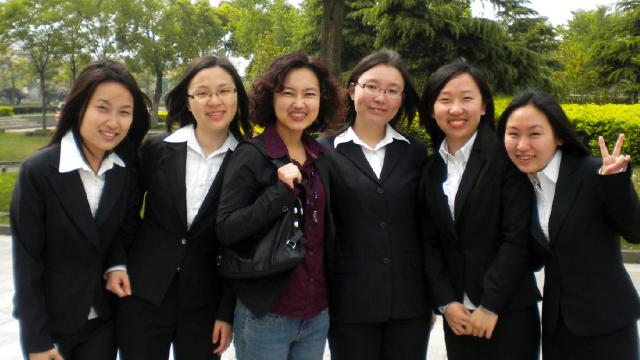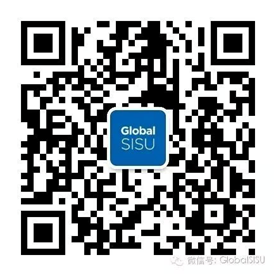Resource:http://en.shisu.edu.cn/resources/news/low-key-style-specialty-interview-liang-wenbo
“ |
There is nothing special in me, so I am a little surprised that I should win the prize,” said Liang Wenbo, who was honored “The Excellent Teaching Award” of Shanghai International Studies University (SISU) in 2015.
She is special in the eyes of the students, as her teaching style is unique. “For issues, Liang always makes careful and detailed analysis, which shows her original insights. She has a good command of knowledge and high acceptance and tolerance for different opinions,” said a sophomore from School of International Finance and Trade.
Her attitudes towards being “a good teacher” and insisting her own teaching career path set a special and “low key” style to the students.
Characteristic Teaching Theory
Liang Wenbo has taught many graduates varying from the generations of 1980s to that of 1990s, since her career in SISU, 1999. She claims that today’s studying conditions for the students are much better compared with the era of hers, so does the students’ capacity. “They have been broadening their view through the solid foundation of education before entering the university.” remarked Liang. She insists that teachers should serve as a basis to direct students to interpret all the surroundings they see.
Now, Liang teaches two courses in SISU’s School of Economics and Finance: the College English and the Intercultural Communication, both of which she has adopted a special teaching method by communicating with students via e-mails. She usually sends learning materials and requires a self-introduction as a feedback, which including students’ views and plans of their study. Liang hopes to know better of her students both in personal ideas and language and writing skills.
“I can read her zeal for teaching,” commented by Zhang Jieqi, a students for Class 2 of the accounting.
Besides the written work, Liang’s also impressive to students for her excellent oral English. “Her accent is a feast to ears,” said her students.
Liang regards the College English more than a language course, instead of basic exercise for skills. “SISU’s senior students need to express their comprehension and analysis of things in English,” said Liang, “They can make full use of the language more meaningfully.”
“She’s always discussing with us, which inspires us a lot,” said Qian Yu, a student majoring in international economics and trading.
Liang maintains that the final goal of language learning rests in skilfully expressing one’s ideas, and language learning serves as a bridge to combine reading and speaking together.
“Large input in language learning aims to gain output,” said Liang, “how to lead students to transforming in this process is what us teachers have to think.”
A variety of teaching methods to encourage students
In order to cultivate the expressing skills of the students, Liang has created several teaching methods that were even beyond the English language itself. The “Comic Interpretation” is one of them.
During the first tern of sophomore, there was a text about professional writers and amateur writers who expressed different views on writing. Liang happened to see some comics related to this topic on the Internet, so she came up with an idea, fostering the students to make their own comics based on the topic.
Their performance was beyond my expectation, even better than the examples on the Internet, Liang was quite pleased with the results of the student eventually and felt quite surprised at their works.
Liang believes that comics are a good form of expressing one’s mind, although there are only a few words in the picture, but it is a beneficial way to train students' ability of thinking and expression. “What’s more, the teachers may better know other talents of students other than their English language ability,” she said.
As for improving students’ verbal skills with high quality, Liang often chooses some topics for students to carry out in-depth discussions. For example, once an article about the nuclear explosion learned this semester was put forward as a discussing topic in the class. Liang asked whether the United States could launch a nuclear bomb to Japan in the name of justice. Consequently, the students actively expressed their views and made a heated discussion.
Liang holds that this kind of topics will not only promote the students' desire to express themselves, but also stimulate students' critical thinking abilities. After all, thinking ultimately determins the quality and depth of expression.
The lessons also teach students to be rigorous. Liang pays much attention to details and references. She requires the students to note the following sources of detailed information when making presentations and at the same time she asks them to choose more professional websites as reference resources.
“Don’t make judgment easily and learn to look for evidence,” a sophomore from School of International Finance and Trade surnamed Chen was quite impressed by Liang’s questions of What is your evidence? . As for him, it was “unexpected gains”.
In English teaching, Liang focuses on students' specialty, consciously adding profession-related content to the teaching materials. Considering the characteristics of students who major in finance and trade, She recommends the students to read Financial Times. During the class, she will choose students to do translation exercises based on the articles in the newspaper so that they can have a deeper understanding of their major.
It is the integration and comprehensiveness of these different teaching ways that make Liang's class both interesting and in-depth. Her lessons have earned a high degree of recognition and praise; she is also well received and respected by the students she loves.




